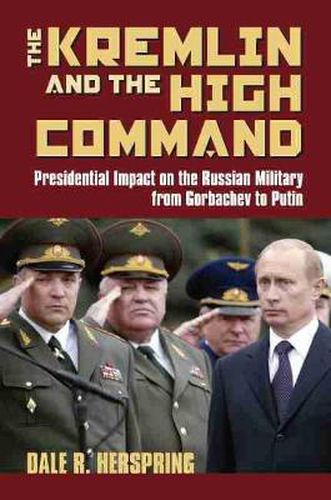Readings Newsletter
Become a Readings Member to make your shopping experience even easier.
Sign in or sign up for free!
You’re not far away from qualifying for FREE standard shipping within Australia
You’ve qualified for FREE standard shipping within Australia
The cart is loading…






Throughout its existence, the Red Army was viewed as a formidable threat. By the end of the Cold War, however, it had become the weakest link in the Soviet Union’s power structure. Always subordinate to the Communist Party, the military in 1991 suddenly found itself answering instead to the president of a democratic state. Dale Herspring closely examines how that relationship influenced the military’s viability in the new Russian Federation. Herspring’s book is the first to assess the relationship between the Russian military and the political leadership under Presidents Mikhail Gorbachev, Boris Yeltsin, and Vladimir Putin. He depicts an outmoded and demoralized military force still struggling to free itself from Cold War paradigms, while failing to confront not only debacles in Afghanistan and Chechnya but also a rise in crime and corruption within the ranks. He reveals how Gorbachev neglected the military to save Russia from internal collapse and how Yeltsin reneged on continuing promises of support. And, while Putin claims a better understanding of the armed forces, he has severely tightened his control over the military while monitoring its struggle toward modernization. Herspring argues that presidential leadership - or a significant lack thereof - has been the key variable determining the kind of military Russia puts in the field. It has been up to the president to ensure that the high command makes a successful transition to the new polity - otherwise combat readiness will decline and generals and admirals could become politicized. By focusing on how the high command has reacted to each president’s decisions and leadership style, Herspring shows that, in spite of the continued importance of the military’s bureaucratic structure, personality factors have assumed a much more important role than in the past.
The Kremlin and the High Command
provides the most complete analysis to date of the Russian president’s influence on the Russian officer corps, the soldiers they lead, and their army’s combat readiness. It also suggests how the often fraught relationship between the president and the high command must evolve if the Russian Federation is to become a truly democratic nation.
$9.00 standard shipping within Australia
FREE standard shipping within Australia for orders over $100.00
Express & International shipping calculated at checkout
Stock availability can be subject to change without notice. We recommend calling the shop or contacting our online team to check availability of low stock items. Please see our Shopping Online page for more details.
Throughout its existence, the Red Army was viewed as a formidable threat. By the end of the Cold War, however, it had become the weakest link in the Soviet Union’s power structure. Always subordinate to the Communist Party, the military in 1991 suddenly found itself answering instead to the president of a democratic state. Dale Herspring closely examines how that relationship influenced the military’s viability in the new Russian Federation. Herspring’s book is the first to assess the relationship between the Russian military and the political leadership under Presidents Mikhail Gorbachev, Boris Yeltsin, and Vladimir Putin. He depicts an outmoded and demoralized military force still struggling to free itself from Cold War paradigms, while failing to confront not only debacles in Afghanistan and Chechnya but also a rise in crime and corruption within the ranks. He reveals how Gorbachev neglected the military to save Russia from internal collapse and how Yeltsin reneged on continuing promises of support. And, while Putin claims a better understanding of the armed forces, he has severely tightened his control over the military while monitoring its struggle toward modernization. Herspring argues that presidential leadership - or a significant lack thereof - has been the key variable determining the kind of military Russia puts in the field. It has been up to the president to ensure that the high command makes a successful transition to the new polity - otherwise combat readiness will decline and generals and admirals could become politicized. By focusing on how the high command has reacted to each president’s decisions and leadership style, Herspring shows that, in spite of the continued importance of the military’s bureaucratic structure, personality factors have assumed a much more important role than in the past.
The Kremlin and the High Command
provides the most complete analysis to date of the Russian president’s influence on the Russian officer corps, the soldiers they lead, and their army’s combat readiness. It also suggests how the often fraught relationship between the president and the high command must evolve if the Russian Federation is to become a truly democratic nation.